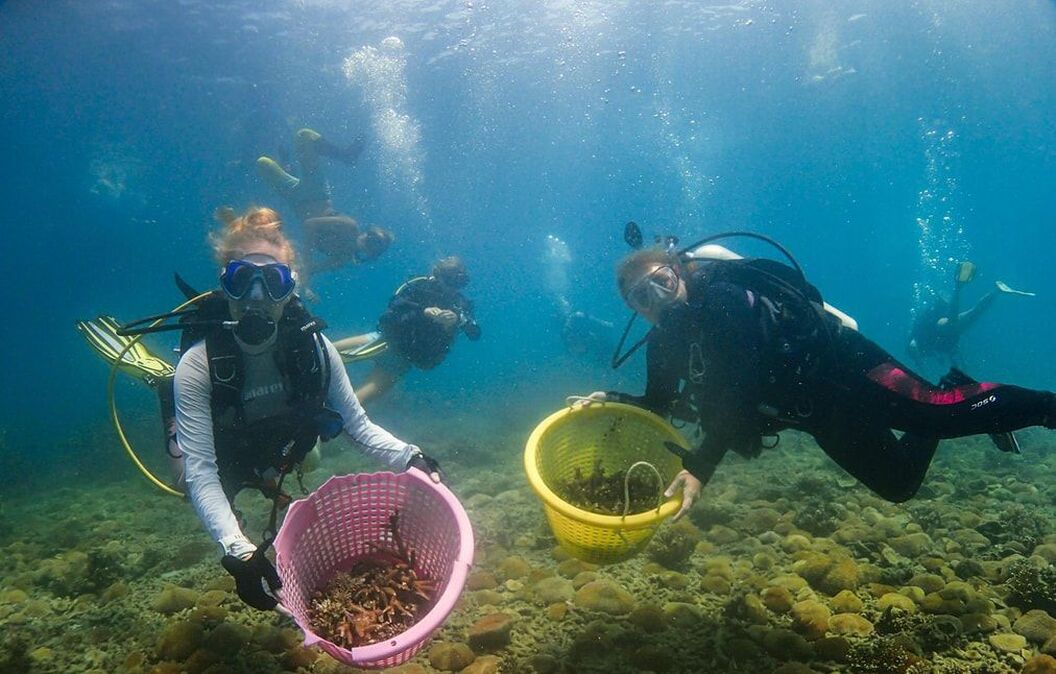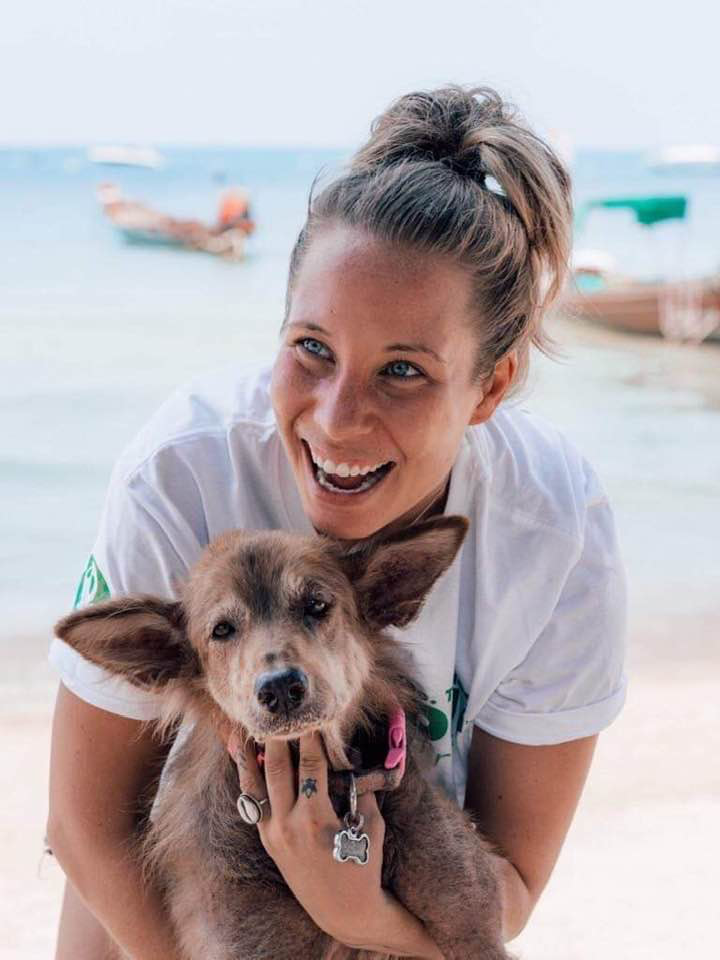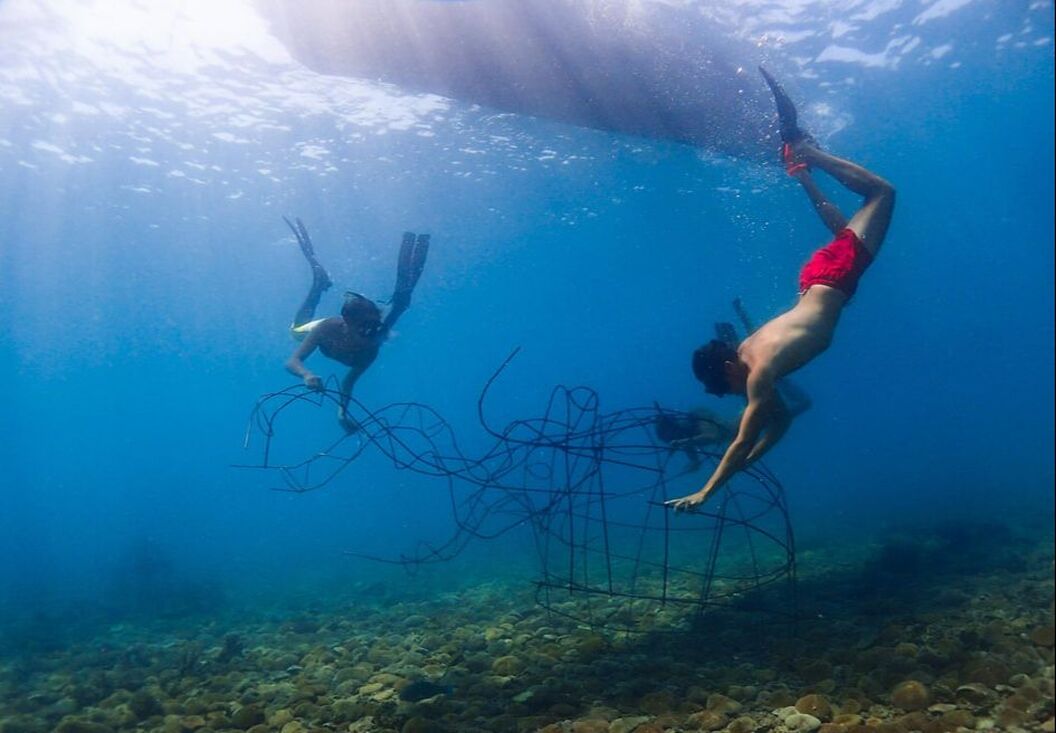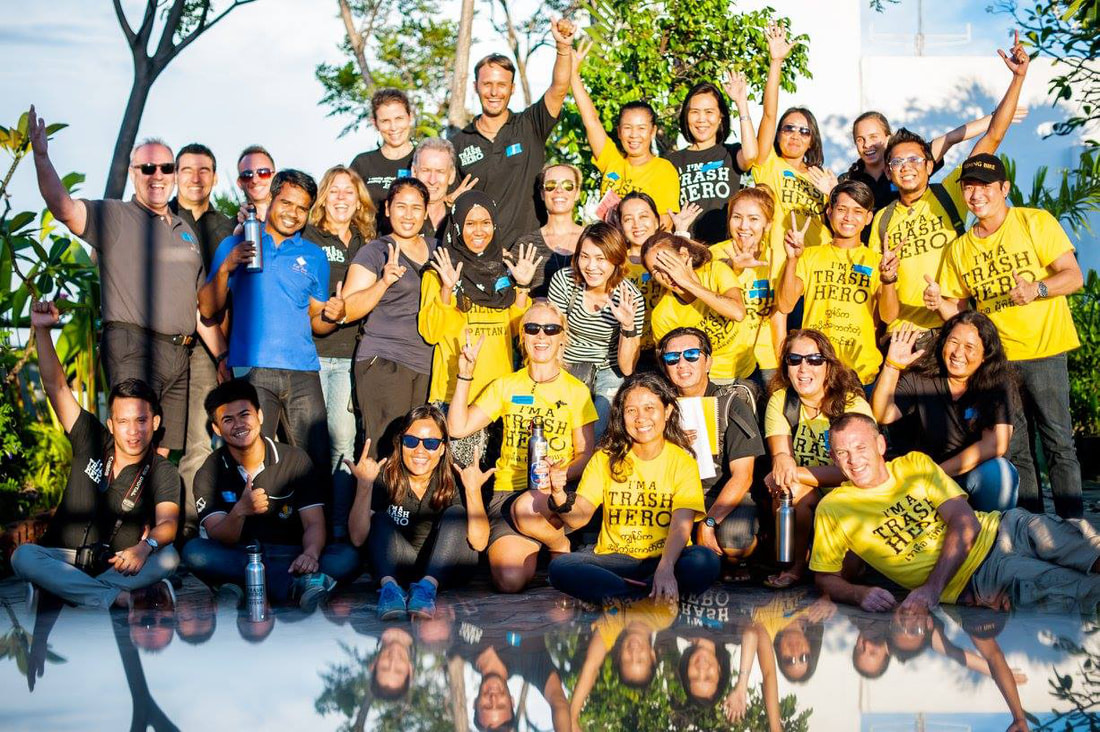From banks and hedge funds in New York to dive instructor and marine conservationist in southern Thailand
By Ruth Gerson
By Ruth Gerson
It never ceases to surprise me the type of careers, occupations or ways women have found to sustain themselves, often starting on the path of one career, just to find themselves in a place that they had not planned to go.
Leslie Finlay falls in the last category, a spirited young woman who takes chances and is not afraid of change. This attitude has taken her to the idyllic island of Koh Tao in southern Thailand.
Although the allure of Koh Tao speaks for itself, I wondered what made Leslie, who was gainfully employed in New York City working for banks and hedge funds, leave all that behind and come to Thailand.
“I got to a point that I had to commit to the job, but being unsure, I took a sabbatical to make up my mind,” she says.
An International Relations and Communications major, Leslie decided to take a “gap year” from her work, one that has extended to seven years, and from the looks of it, may be permanent.
Leslie yearned to see Asia and so she set foot on this vast continent in 2012 in Korea to teach English. It seems that all high schools in Korea, private as well as public, have one foreign English teacher for the program that Leslie had joined. While teaching, Leslie also began writing for travel magazines to supplement her income. “It was a great transition,” she says.
Leslie Finlay falls in the last category, a spirited young woman who takes chances and is not afraid of change. This attitude has taken her to the idyllic island of Koh Tao in southern Thailand.
Although the allure of Koh Tao speaks for itself, I wondered what made Leslie, who was gainfully employed in New York City working for banks and hedge funds, leave all that behind and come to Thailand.
“I got to a point that I had to commit to the job, but being unsure, I took a sabbatical to make up my mind,” she says.
An International Relations and Communications major, Leslie decided to take a “gap year” from her work, one that has extended to seven years, and from the looks of it, may be permanent.
Leslie yearned to see Asia and so she set foot on this vast continent in 2012 in Korea to teach English. It seems that all high schools in Korea, private as well as public, have one foreign English teacher for the program that Leslie had joined. While teaching, Leslie also began writing for travel magazines to supplement her income. “It was a great transition,” she says.
| Not having traveled much, Leslie liked the freedom her new work gave her, along with school vacations that allowed time for outdoor experiences, exploring the terrain and practicing adventure sports. In the Philippines Leslie was introduced to scuba diving and loved it immediately. This passion took her to Indonesia with its many exquisite diving sites, where she trained as diving instructor acquiring a license as trainer in this extreme sport. It was not long before she heard of Koh Tao through friends, from the small and connected scuba world where people move around frequently. With a smile on her face, Leslie says enthusiastically, “With scuba diving you get to live in some amazing places!” Licensed in Thailand, Leslie free-lanced as diving instructor for a while. Enquiring whether foreign diving instructors infringe on the work of local Thais, the answer is “No.” According to Leslie, there are very few Thai diving instructors on Koh Tao, although there are numerous around the country. She adds that in fact the locals on Koh Tao like having the foreign diving instructors stay there, as diving brings other businesses along with it, supporting hotels, restaurants and the usual community businesses. As of now, according to Leslie, “Koh Tao is the most popular place in the world to learn diving.” However, with the weakening Thai economy this may change with people looking for alternate destinations in the Philippines and Indonesia. |
Marine life introduced Leslie to other aspects of life in the sea, some good, some problematic. While tourism is good for the local economy of the island, it is detrimental to its ecology, both in and out of the water. Obvious to the eye is the amount of trash the influx of human presence causes. Less obvious is the underwater damage caused to coral and other marine life by the continuous excursions of boats into the sea for diving, anchoring and inadvertently harming the space around them. Seeing this, Leslie’s interest shifted to conservation about three years ago.
It is interesting to follow the way the conservation movement evolved from the diving school. The New Heaven Diving School was established in 1995 by marine biologists from the US, Australia, UK, Korea and Canada, with a dedicated permanent staff. It seems natural that it sprung an offshoot, one known as The New Heaven Conservation Program where Leslie had worked as intern in 2016-2017 for the period of six months.
The conservation diving program was launched in 2007 by Chad Scott, an American reef scientist who is largely responsible for much of the conservation activity today on Koh Tao and in the Gulf of Thailand. This is where Leslie became deeply involved in environmental causes and issues that include turtle monitoring program, coral restoration, and monitoring water quality checking for chemicals, activities that still take Leslie daily into the water.
So it seems that she has finally found her vocation. “Working in the underwater environment builds passion in ocean conservation,” says Leslie. Leslie feels that this work is not only a turning point in her career, but also a stepping stone that is taking her where she feel comfortable and where she could possibly make a difference. She now lectures at the dive center and helps set up coral restoration by building artificial reefs. She also consults as well as trains people to run these programs.
It is interesting to follow the way the conservation movement evolved from the diving school. The New Heaven Diving School was established in 1995 by marine biologists from the US, Australia, UK, Korea and Canada, with a dedicated permanent staff. It seems natural that it sprung an offshoot, one known as The New Heaven Conservation Program where Leslie had worked as intern in 2016-2017 for the period of six months.
The conservation diving program was launched in 2007 by Chad Scott, an American reef scientist who is largely responsible for much of the conservation activity today on Koh Tao and in the Gulf of Thailand. This is where Leslie became deeply involved in environmental causes and issues that include turtle monitoring program, coral restoration, and monitoring water quality checking for chemicals, activities that still take Leslie daily into the water.
So it seems that she has finally found her vocation. “Working in the underwater environment builds passion in ocean conservation,” says Leslie. Leslie feels that this work is not only a turning point in her career, but also a stepping stone that is taking her where she feel comfortable and where she could possibly make a difference. She now lectures at the dive center and helps set up coral restoration by building artificial reefs. She also consults as well as trains people to run these programs.
To be able to do this work, Leslie returned to study, working on line for her Master of Science degree from Indiana University in the US. Her focus is on Non Profit Management that is part of Environmental Policy study.
In an effort to reduce the influx of plastic in the world’s waters, Leslie now dedicates time to Trash Hero, a grassroots organization committed to zero waste communities, founded in Thailand in 2014 by a Swiss man, Roman Peter, who started cleaning one beach in Koh Lipe in the Andaman Sea, and it grew from there.
Trash Hero is now active with 200 chapters in seven countries and has a staggering number of 300 million volunteers.
Of these, Thailand and Indonesia are the most involved in the project. Peter’s mission was to empower local leaders who are committed to advocacy and education, and who run this program. Full of enthusiasm Leslie exclaims, “It is a fantastic organization!”
Leslie’s contribution to Trash Hero is running the fundraising program – pro bono. All those involved in the organization work pro bono, earning their livelihood in variety of ways. Leslie supports herself by giving some diving lesson, tutoring English on line, and writing articles for travel magazines.
What about the future? Leslie hopes one day to move and open a dive school with her boyfriend who is currently the general manager of the dive centre. The location will be dictated by tourism trends of the future. She feels that they make a strong team: he in recreational diving, she in marine conservation training and projects. Indeed, a sparkling future.
In an effort to reduce the influx of plastic in the world’s waters, Leslie now dedicates time to Trash Hero, a grassroots organization committed to zero waste communities, founded in Thailand in 2014 by a Swiss man, Roman Peter, who started cleaning one beach in Koh Lipe in the Andaman Sea, and it grew from there.
Trash Hero is now active with 200 chapters in seven countries and has a staggering number of 300 million volunteers.
Of these, Thailand and Indonesia are the most involved in the project. Peter’s mission was to empower local leaders who are committed to advocacy and education, and who run this program. Full of enthusiasm Leslie exclaims, “It is a fantastic organization!”
Leslie’s contribution to Trash Hero is running the fundraising program – pro bono. All those involved in the organization work pro bono, earning their livelihood in variety of ways. Leslie supports herself by giving some diving lesson, tutoring English on line, and writing articles for travel magazines.
What about the future? Leslie hopes one day to move and open a dive school with her boyfriend who is currently the general manager of the dive centre. The location will be dictated by tourism trends of the future. She feels that they make a strong team: he in recreational diving, she in marine conservation training and projects. Indeed, a sparkling future.





 RSS Feed
RSS Feed
















